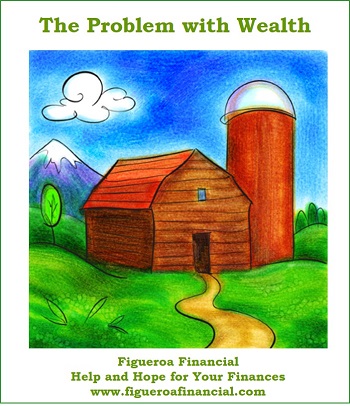 Then He said to them, “Beware, and be on your guard against every form of greed; for not even when one has an abundance does his life consist of his possessions.”
Then He said to them, “Beware, and be on your guard against every form of greed; for not even when one has an abundance does his life consist of his possessions.”
Luke 12:15 (NASB)
As we get to the end of Financial Literacy Month, I wanted to touch on the fundamental topic of generosity.
Generosity is a financial muscle that should be exercised often so it can be developed.
You see, as much as I want you to do well with your money and to prosper financially, I have a greater concern.
I want to make sure that money does not become the primary preoccupation in your heart.
I want you to have the proper perspective with money now, so as you prosper it can be a blessing to you and not a curse. I don’t want you to have a problem with wealth.
Jesus knows us and he knew the great temptation wealth can be for everyone. I think that’s one of the reasons He spoke so often on the proper context for material wealth.
On one occasion, while He was teaching, a man asked Him to make a judgment on a family inheritance between him and his brother.
It seemed that one brother that was probably serving as the executor of the state, was withholding the goods from everyone else.
Interestingly enough, Jesus refused to be drawn into the family dispute. Instead, he took the opportunity to teach us a great lesson about how to handle wealth.
You can find the full text of His teaching in Luke 12:13-21.
The Question of Wealth
16 And He told them a parable, saying, “The land of a rich man was very productive.
17 And he began reasoning to himself, saying, ‘What shall I do, since I have no place to store my crops?’
Here is the story of a man that worked hard and his land was very productive. Obviously he had been blessed in his diligence.
In the first place, I want to remind you that there is no condemnation for creating wealth from the work of your hands.
But also note that the produce of the land was more than enough to sustain himself. He had more than he could store in his existing barns.
So logically, the question was, what to do about that abundance?
The Problem with Wealth: Greed
18 Then he said, ‘This is what I will do: I will tear down my barns and build larger ones, and there I will store all my grain and my goods.
19 And I will say to my soul, “Soul, you have many goods laid up for many years to come; take your ease, eat, drink and be merry.”’
Here is the problem, instead of the man considering how to bless others with his abundance, he had turned inward.
Just in verse 18 there are 3 uses of the pronoun “I” and 3 uses of the possessive “my”. At this point it was all about himself.
Instead of responding with gratitude and contentment, the man had the wrong response to the blessing he received: greed.
Webster defines greed as the “a selfish desire to have more of something (especially money)”. The Scriptures condemn greed as idolatry (Colossians 3:5).
The man’s plan was simply hoard goods and worry about himself only.
And that’s the problem with wealth: it can turn us away from others and God. It can simply lead us to just want more and more.
The Futility of Greed
20 But God said to him, ‘You fool! This very night your soul is required of you; and now who will own what you have prepared?’
21 So is the man who stores up treasure for himself, and is not rich toward God.”
So is this passage teaching that we will die on the spot if we are greedy? That God needs our money?
Absolutely not. The first point it teaches is that we are all here today and gone tomorrow. Our lives on earth are very brief in the context of eternity.
We show a heart of wisdom when we understand that reality (Psalm 90:12). Our times are in God’s hands.
Second, it also teaches that no matter how much we store here on this earth, we can’t take anything with us. It will all go to someone else.
Finally, God does not need our money. He owns it all (Psalm 24:1). The lesson indeed is that we should put money and wealth in the proper context.
The Proper Response to Wealth
When we are rich towards God, we are putting the priority of what matters to Him.
It means that we use our wealth according to what He wants to do, not according to what we want to do.
The man was preoccupied only with himself and God showed him the futility of his thinking.
Instead, you and I can think first about Him and about others. We can choose to be a blessing to everyone else.
Yes, take care of yourself and your family for sure (I Tim 5:8).
But don’t stop there. Share with others. At every opportunity, do what you can, for who you can, with as much as you can (I John 3:17-18).
That’s the proper response to wealth.
19 “Do not store up for yourselves treasures on earth, where moth and rust destroy, and where thieves break in and steal.
20 But store up for yourselves treasures in heaven, where neither moth nor rust destroys, and where thieves do not break in or steal;
21 for where your treasure is, there your heart will be also.
Matthew 6:19-21 (NASB)
Question: How can you develop your generosity muscle today?
This post is also available in: Spanish
